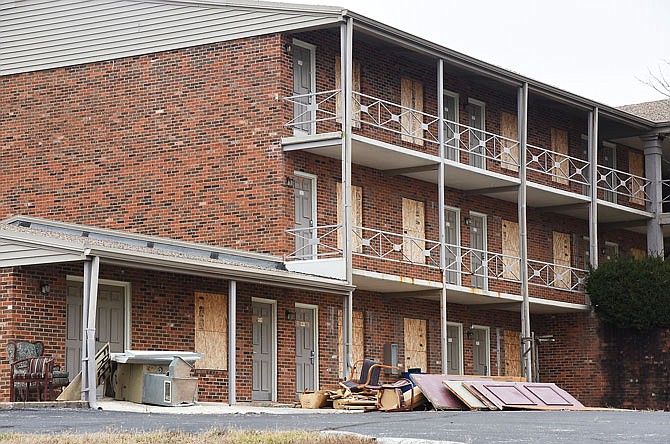The Puri family's latest proposal for two new hotels and a conference center along Jefferson Street won unanimous approval from the Jefferson City Planning and Zoning Commission at its Thursday meeting at City Hall.
Vic Puri, the executive vice president and general counsel of the family-owned Puri Group Enterprises (PGE), prefaced the vote with positive comments about his recent contacts with the Jefferson City Housing Authority, contacts he considered sufficiently supportive and encouraging enough he decided to press ahead with the $58 million plan affirmed Thursday.
Now known as the Truman Hotel Urban Renewal Plan, it includes an almost immediate launch, depending on a subsequent City Council approval of demolition of the existing hotel complex at 1510 and 1590 Jefferson St., properties known as the Truman Hotel and, previously, the Ramada Inn.
Following that work, the Puri group would initiate construction of a new five-story, 131-room business class hotel with an indoor pool and restaurant and a new four-story 125-room business class hotel and replacement of the existing conference space with a new two-story, 20,000-square-foot conference, meeting and event facility.
The Puri project was represented at the session by former Mayor George Hartsfield, a retired business leader who has volunteered to assist PGE in its journey through the multiple hurdles posed by city government to all developments, large and small. Hartsfield distributed a letter from recently-retired Jefferson City Planning Director Janice McMillan, then stepped aside when Commission Chairman Chris Jordan and other members asked questions about the PGE strategy, deferring to Puri.
The lawyer and hotelier expressed disappointment and frustration when a similar redevelopment proposal was stymied by a deadlocked Council in late September.
Thursday night, he said he chose to begin this second attempt at city approval with the Housing Authority and its Land Clearance Redevelopment Authority (LCRA). On Jan. 17, those bodies approved a recently-submitted Puri white paper outlining the downtrodden status of the Truman site. That qualified the site as a blighted area eligible for 10-year tax abatement. Cynthia Quetsch, executive director of the Housing Authority, was at City Hall to inform the Planning Commission of her entity's latest action.
Puri said, "Ultimately, (the plan) has to come back to the LCRA to see if it is a viable situation, if the city believes it is a good idea. The previous development was not received positively in the first go around.
"So, instead of wasting the city's time, we wanted to go back to the ultimate decision maker to see if it is a positive contribution to the community," Puri said. "They (the Housing Authority and LCRA) are independent; there's no politics in play, in my opinion. And so we took it to them, to the business leaders of the community, who are very concerned about the community as a whole, about its growth as a whole. They have a desire to take everyone in the community forward."
Puri concluded, "They gave us a very positive thumbs up, and we're now moving forward accordingly."
The Planning and Zoning Commission's vote moves the Puri proposal to a public hearing, which will precede the Feb. 20 City Council meeting.
An analysis of the Puri plan offered Thursday night by senior planner Eric Barron said, "The 1996 Comprehensive Plan Update identifies the area as being intended for commercial development. The plan to redevelop the site for commercial purposes, including hotel, conference center and incidental uses, would conform to the recommended commercial use of the property."
Barron said because the Truman plan meets those criteria, the city recommended its approval.
He had similar comments about a proposal from the Farmer Companies' Capital Mall JC, LLC, for the shopping center the family-owned development group has been working since 2013. The Final Subdivision Plat, in the 3600 block of County Club Drive, also won the Planning and Zoning Commission's unanimous OK, but it was not an action that requires a public hearing before the City Council.
Instead, the proposal for altering the platting around the shopping center will be submitted to the Council at its two March meetings as a bill, Barron said Thursday.
The Farmer proposal noted Capital Mall "was developed in the late 1970s but was never formally divided into lots and outlots." A development agreement approved by the Council in 2013 permitted the owner to divide the property into several lots based on existing tax parcel boundaries and outlined a plan that would require a formal subdivision plat at a future date. That date came Thursday night.
The proposal suggests the 55.2-acre subdivision now features 11 lots. The plan excludes the Dillard's and JC Penney stores, which are owned by their respective companies, Barron said. It also is platted around the Hy-Vee, the existing theater, a forest and a buffer yard adjacent to residential neighborhood. The proposal will create new lots, including near the existing Wendy's and Pizza Hut.
Barron said city staff approved the proposal, which was presented by Paul Samson, of CMPS, a consulting firm retained by the Farmer Companies.
The commission also received updates on the Capitol Avenue/East High Street Rezoning and Overlay District Implementation Plan, the Southside/Old Munichburg Neighborhood Plan, the Capital Area Pedestrian and Bicycle Plan and long range initiatives for the city. The lengthy presentation on Capitol Avenue will be continued with what Barron and interim Planning and Protective Services Department Director Sonny Sanders said would be an as-yet unscheduled two-hour luncheon meeting. The bike plan will be presented to the Parks Commission at its Tuesday meeting.

